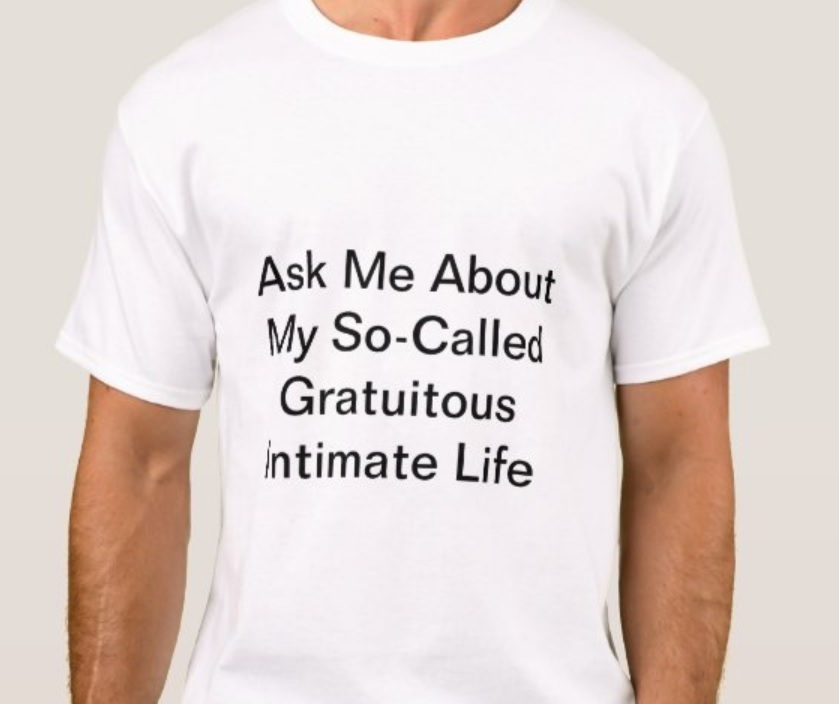by Craig Wiesner – San Mateo Daily Journal – December 28th, 2023
A reader responded to my Thanksgiving week column asking why I would “inject my gratuitous intimate life into the conversation.” My first reaction was wondering how soon I could get a t-shirt printed with “Ask Me About My So-Called Gratuitous Intimate Life” on it. The column was about many of the things I am thankful for, including my husband Derrick (who asked me why I hadn’t included his name in the column and I said I only get 800 words), and our dog Holly, and our evening routine with her snuggling next to me until Derrick gives her a cookie to get her off the bed. Is that too intimate to share? I was gratified to see a column by a fellow writer, Mike Nagler, the next day, where he shared some pretty intimate details of life with his wife JoAnneh. No response to his column about gratuitous intimate details appeared. Hmmm.

I have to admit that it has taken me decades to use the words “my husband” when talking about Derrick. They are certainly words I never dreamed I would be able to use when I became fully aware that I was gay as a teenager, or, when Derrick and I got married 34 years ago. Even today, when someone asks a question in our store like “Are you the owner?” I could just say “yes” but that wouldn’t be the full truth. I usually say “My husband and I are the owners.” I could use the word “partner” but that wouldn’t be the full truth either. So yes, I do something truthful and yes, political, when I say “my husband” to people. Since I’ve started doing that I’ve rarely had anyone react negatively. Derrick is, legally, actually, truthfully, and fully, my husband, recognized by every state in our union thanks to the Supreme Court’s Obergefell v Hodges decision in 2015. Calling him my husband is a right that millions have fought for and when the San Mateo Daily Journal offered me an opportunity to reach 80,000 people on Tuesdays, I did make a decision that I would include those two words whenever I felt it was appropriate. And now I’ll share one story of the long struggle to be able to say those words.
In 1998 Derrick was elected to be a commissioner to the Presbyterian Church USA (PCUSA) General Assembly. This was long before the denomination was open to LGBTQIA+ people. Some members of the San Jose Presbytery (the governing body of local churches in this area) were outraged that a gay man had been elected to that position and spent months attacking him, me, our pastors and our congregation. We got threatening letters and phone calls but Derrick, our church, and many supporters in the Presbytery did not back down.
Derrick and I flew to Charlotte, North Carolina where I watched him perform his service as a commissioner, making many decisions about the future of the denomination, including whether or not LGBTQIA+ people would be welcome (the answer then was no). As I sat in the bleachers watching one debate an elderly woman next to me clucked her tongue and said “I don’t understand why these homosexuals can’t just be quiet about who they are.” I introduced myself and pointed to Derrick, and told her what had happened in our Presbytery, detailing one particular terrible phone call we’d gotten at home. Aghast, she said “I had no idea people were being treated that way. I’m sorry! I’ve been wrong about this.”
After many grueling days at the assembly, we headed home. At the Charlotte airport Derrick and I approached the ticket counter and the agent said to me “You get back in line and wait.” I said “I’m with him, we’re traveling together.” She responded “I don’t care, get back in line.” I said “But you just served that couple in front of us.” She said “You’re NOT a couple. Get back in line or I’ll have you arrested.” Near tears, I got back in line.
Today the PCUSA has an office of LGBTQIA+ Affairs, marriage equality is the law of the land, no ticket agent will turn my husband and me away, and I’m a columnist with the privilege of sharing 800 words with 80,000 people every other Tuesday. Do I have an agenda in what I write? Absolutely. I’m working for a world where nobody feels excluded because of who they are, whom they love, their religious life or lack thereof, how they present, their socio-economic status, their gender, age, abilities or disabilities. If sharing intimate details of my life makes life easier for one person, or many, even if it bothers some others, I’m gonna do it. Now I have to go order that T-Shirt! Happy New Year.